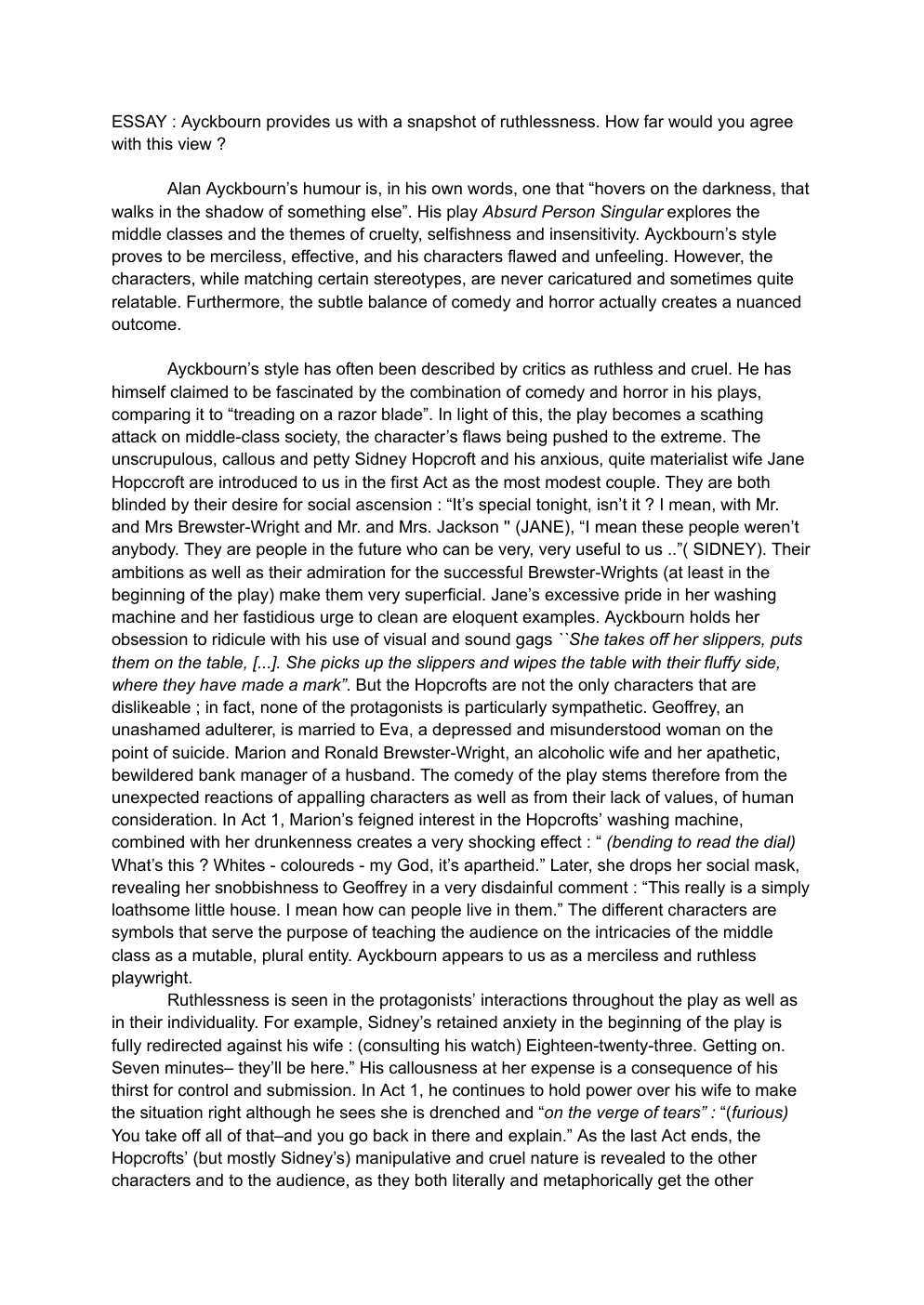ESSAY : Ayckbourn provides us with a snapshot of ruthlessness. How far would you agree with this view ?
Publié le 11/04/2024
Extrait du document
«
ESSAY : Ayckbourn provides us with a snapshot of ruthlessness.
How far would you agree
with this view ?
Alan Ayckbourn’s humour is, in his own words, one that “hovers on the darkness, that
walks in the shadow of something else”.
His play Absurd Person Singular explores the
middle classes and the themes of cruelty, selfishness and insensitivity.
Ayckbourn’s style
proves to be merciless, effective, and his characters flawed and unfeeling.
However, the
characters, while matching certain stereotypes, are never caricatured and sometimes quite
relatable.
Furthermore, the subtle balance of comedy and horror actually creates a nuanced
outcome.
Ayckbourn’s style has often been described by critics as ruthless and cruel.
He has
himself claimed to be fascinated by the combination of comedy and horror in his plays,
comparing it to “treading on a razor blade”.
In light of this, the play becomes a scathing
attack on middle-class society, the character’s flaws being pushed to the extreme.
The
unscrupulous, callous and petty Sidney Hopcroft and his anxious, quite materialist wife Jane
Hopccroft are introduced to us in the first Act as the most modest couple.
They are both
blinded by their desire for social ascension : “It’s special tonight, isn’t it ? I mean, with Mr.
and Mrs Brewster-Wright and Mr.
and Mrs.
Jackson '' (JANE), “I mean these people weren’t
anybody.
They are people in the future who can be very, very useful to us ..”( SIDNEY).
Their
ambitions as well as their admiration for the successful Brewster-Wrights (at least in the
beginning of the play) make them very superficial.
Jane’s excessive pride in her washing
machine and her fastidious urge to clean are eloquent examples.
Ayckbourn holds her
obsession to ridicule with his use of visual and sound gags ``She takes off her slippers, puts
them on the table, [...].
She picks up the slippers and wipes the table with their fluffy side,
where they have made a mark”.
But the Hopcrofts are not the only characters that are
dislikeable ; in fact, none of the protagonists is particularly sympathetic.
Geoffrey, an
unashamed adulterer, is married to Eva, a depressed and misunderstood woman on the
point of suicide.
Marion and Ronald Brewster-Wright, an alcoholic wife and her apathetic,
bewildered bank manager of a husband.
The comedy of the play stems therefore from the
unexpected reactions of appalling characters as well as from their lack of values, of human
consideration.
In Act 1, Marion’s feigned interest in the Hopcrofts’ washing machine,
combined with her drunkenness creates a very shocking effect : “ (bending to read the dial)
What’s this ? Whites - coloureds - my God, it’s apartheid.” Later, she drops her social mask,
revealing her snobbishness to Geoffrey in a very disdainful comment : “This really is a simply
loathsome little house.
I mean how can people live in them.” The different characters are
symbols that serve the purpose of teaching the audience on the intricacies of the middle
class as a mutable, plural entity.
Ayckbourn appears to us as a merciless and ruthless
playwright.
Ruthlessness is seen in the protagonists’ interactions throughout the play as well as
in their individuality.
For example, Sidney’s retained anxiety in the beginning of the play is
fully redirected against his wife : (consulting his watch) Eighteen-twenty-three.
Getting on.
Seven minutes– they’ll be here.” His callousness at her expense is a consequence of his
thirst for control and submission.
In Act 1, he continues to hold power over his wife to make
the situation right although he sees she is drenched and “on the verge of tears” : “(furious)
You take off all of that–and you go back in there and explain.” As the last Act ends, the
Hopcrofts’ (but mostly Sidney’s) manipulative and cruel nature is revealed to the other
characters and to the audience, as they both literally and metaphorically get the other
couples to dance to their tune : “He screams at the dancers in mounting exhortation
bordering on the hysterical”.
Generally, the relations between the characters are truly
representative of a self-obsessed class with no consideration for others and the problems
they might have.
Sidney’s attitude towards Jane and Eva are multiple examples of his
incapacity to feel empathy for others even though they are in a state of utter despair :
“(almost screaming in EVA’s ear) This is the last time I accept hospitality in this household.”
The humour of the play thus often derives from absurd situations endangered by the
selfishness and cruelty of some of the characters.
We may as well consider the reaction of the audience as quite ruthless and
insensitive.
Ayckbourn plays on a fine balance made out of a combination of particularly
tragic and comic elements.
This duality is what’s capable of eliciting....
»
↓↓↓ APERÇU DU DOCUMENT ↓↓↓

































